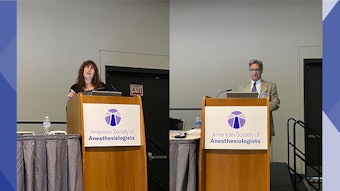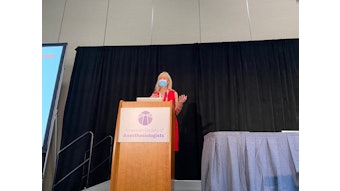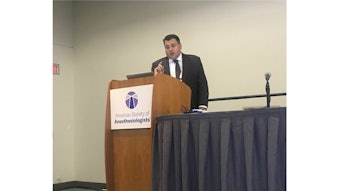Pain points among genders
A new survey reveals pandemic stress and burnout is higher among females in critical care medicine.

There’s no question that the COVID-19 pandemic affects the mental and emotional health of health care workers. But is it different for men and women?
A recent completed during the pandemic suggests pandemic-related stress and burnout differs by gender. The survey, which has not yet been published, evaluated the stress, anxiety, feelings of burnout, and bias in critical care medicine (CCM) as perceived by anesthesia-trained intensivists in the U.S. That survey and remedies for improved emotional well-being were the focus of 2021’s session “What Anesthesia-Trained Intensivists Say About Stress, Bias, and Burnout During the Pandemic.”
“Generally speaking, the main causes were stress and fear of pandemic-related work. Bias and a lack of diversity was perceived more by women and the causes were manifold,” said Shahla Siddiqui, MD, DABA, MSc, FCCM, an Assistant Professor of Anesthesiology at Harvard Medical School in Boston. “Our panel explored the challenges faced by CCM anesthesiologists during the pandemic and beyond.”
In particular, the survey shows there are significant differences between the stress, job satisfaction and perceptions of burnout, anxiety, and bias faced by women and men in CCM. According to Dr. Siddiqui, women expressed positive feelings less often than men, which may reflect “continued gender inequity in society, the work life imbalance borne by women, and their unequal emotional labor of caregiving.”
Citing fear of the pandemic, safety of self and family, and a shortage of PPE as the main causes of stress for anesthesia-trained intensivists in CCM, Dr. Siddiqui said the main causes of burnout are similar, including anxiety, fear, and physical and moral fatigue.
According to survey results, 32.3% of respondents reported having moderate to severe symptoms of anxiety, and women physicians were significantly more likely to report excessive symptoms of anxiety. Additionally, 63.8% of respondents said their contribution to critical care had increased during the pandemic, and 44% were satisfied by the experience. However, these proportions were significantly less for women physicians.
“The survey suggests how the stress of the pandemic could exacerbate implicit cognitive bias, gender disparities, prejudice in caring for patients of color, and physicians’ sense of well-being,” Dr. Siddiqui said.
According to Dr. Siddiqui, current data demonstrates the need for greater accountability and recognition, and that conversations about bias as well as increased diversity training are necessary. Even more important, she said, is support from health care leaders.
Visit Anesthesiology Today Annual Meeting Edition for more articles.










![Sharks[2]](https://img.ascendmedia.com/files/base/ascend/hh/image/2021/10/Sharks_2_.616369899ebe1.png?auto=format%2Ccompress&bg=fff&fill-color=fff&fit=fill&h=191&q=70&w=340)
